Monika Schaefer
The Flipside with Monika – Ep 15 with
Jürgen Neumann on Ernst Zündel
Sat, Oct 12, 2024
[In this weekly podcast episode The Flipside with Monika on Republic Broadcasting Network, Canadian nationalist and author, Monika Schaefer talks with Jürgen Neumann and his time working with Ernst Zündel, the famous Canadian-German revisionist.
Key points include:
Jurgen Neumann worked as a videographer for Ernst Zundel for decades.
Ernst Zundel was a German immigrant to Canada who challenged the mainstream Holocaust narrative.
Zundel had a “moment of awakening” when he met Adrian Arcand, a French Canadian who had been in a Canadian concentration camp for six years during WWII.
Arcand showed Zundel historical information that contradicted the mainstream narrative: “he started showing him his library of thousands of books and started giving him all the other information that he had been denied all these years.”
Zundel described this experience as being “born again” with the truth.
In the late 1970s, Zundel ran for leadership of the Liberal Party of Canada, giving him a platform to speak about issues facing German immigrants.
In 1980, there was a major raid on Zundel’s supporters in Germany, leading to protests against him in Toronto.
Zundel began using video to document events and spread his message in the early 1980s.
Zundel met Robert Faurisson, described as “the world’s foremost revisionist”, who focused on questioning the existence of gas chambers.
Zundel faced legal troubles, including having his mail service cut off and being charged with “spreading false news.”
Zundel’s 1985 trial lasted six weeks and received extensive media coverage.
The trial featured testimony from Holocaust survivors that was heavily scrutinized: “it was the first time that former camp inmates were properly cross examined by a lawyer.”
A second trial in 1988 lasted almost four months and included even more information challenging the Holocaust narrative.
Jurgen Neumann accompanied Zundel on several trips to Auschwitz.
Neumann now maintains a BitChute channel called “John Robinson 101” where he uploads videos related to Zundel’s work. It contains “over a thousand videos” related to Holocaust revisionism and Zundel’s activities.
The discussion portrays Zundel as a truth-seeker facing persecution for his views, and Holocaust revisionism as a legitimate historical inquiry, rather than as hate speech or anti-semitism.
– KATANA]
https://www.republicbroadcastingarchives.org/the-flipside-with-monika-october-12-2024/
https://freespeechmonika.com
https://gab.com/MonikaSchaefer
https://odysee.com/@MonikaSchaefer:2
Monika’s book: https://barnesreview.org/product/sorry-mom-i-was-wrong-about-the-holocaust/
Published on Sat, Oct 12, 2024
Description
Real news, real talk, real people…
because you can handle the truth.
LISTEN to RBN *LIVE*
Your browser does not support the audio element for this particular LIVE RBN stream player. Visit: HOW TO LISTEN for more options!
Social media Share this article
The Flipside with Monika, October 12 , 2024
By RBN October 12, 2024 20:00
Related Articles
• The Flipside with Monika, July 13, 2024 4 13.Jul
• The Flipside with Monika, August 17, 2024 2 17.Aug
• The Flipside with Monika, July 27, 2024 2 27.Jul
Republic Broadcasting Network
The Flipside with Monika, October 12 , 2024
Podcast: Play in new window | Download
Subscribe: RSS
Episode 15: Guest Jürgen Neumann was the videographer and right-hand man for Ernst Zündel during several decades. We discuss how Ernst Zündel learnt the truth about his native Germany and what he did with that knowledge.
Social media Share this article
By RBN October 12, 2024 20:00
Write a comment
_____________
Following Transcript Quality = 5 Stars
1 Star — Poor quality with many errors, contains nonsense text 2 Stars — Low quality with many errors, some nonsense text. 3 Stars — Medium quality with some errors. 4 Stars — Good quality with only a few errors. 5 Stars — High quality with few to no errors.
NOTE: Readers can help improve the quality of this transcript by putting corrections in the Comment/Leave a Reply section. Don’t be just a consumer, contribute to the cause, however small. Thanks.
TRANSCRIPT
(Words: 7,778 – Duration: 60 mins)
[Intro music]
[01:05]
Monika Schaefer: Good evening. Greetings. You are listening to the Republic Broadcasting Network at Republicbroadcasting.org. It is October 12, 2024. And this is The Flipside with Monika. And I am your host, Monika Schaefer.
Okay, good news. We have a very special guest, and we had a small technical glitch, but I understand he is on the line.
And so I’m going to bring him on without too much further ado. But I’ll just set the stage a little bit and then invite my guest to give a little bit more background. His name is Jurgen Neumann, or Jurgen Neumann, I’m not sure how he likes to pronounce it. And he worked for many years, in fact, for decades, as a videographer for Ernst Zundel, or Ernst Zundel, pronounced German. And he was pretty much Ernst Zundel’s right hand man and did very many interesting things, went over to Auschwitz, not just once, but several times.
And probably most of you are familiar with the name Ernst Zundel. He was taken through the court system for reaching the wrong conclusions about World War Two, that untouchable topic that we are all supposed to believe in. Only one narrative, the Holocaust narrative! So that’s a big story.
And I always say this is still very relevant. Obviously, it is still very relevant. They put people in jail still to this day for doubting that story. And there are ever more countries that are criminalizing people who question that narrative. And Ernst Zundel was one of the greats in exposing the lies and revealing the truth about World War Two history and what exactly happened or did not happen in Germany. And Jurgen Neumann is continuing his work to this day with re-uploading videos from that are old interviews, old radio broadcasts that Ernst Zundel did decades ago. And he is busy every day doing this work.
And so I would like to welcome Jurgen Neumann to the show. Are you there?
Jürgen Neumann: I am, Monika. Thank you for having me on.
Monika Schaefer: Oh, you’re so welcome! I’m very, very happy to have you on.
And I think that people are going to learn a thing or two because I learned something new just today, earlier today when we were talking for 20 minutes or half an hour on the phone in anticipation of tonight’s show. And that was really, really great. I learned something new.
So anyway, why don’t you just set the stage a little bit more with your own background and involvement. Because then we will be talking mostly about Ernst Zundel and the greater story about that. But I do want people to know a little bit about you. So go ahead, please.
Jürgen Neumann: All right. Basically, for me, it started back in the early 1970s, anyway.
Now, my father was a German army veteran from World War Two, and so I have a little bit of a connection to that time, etcetera.
And so what happened was that he discovered through another veteran he was talking to, that there was going to be some sort of a meeting going on in Buffalo, New York. And he asked me if I would like to go along, that has something to do with at some German group there. So I agreed to go with them. We went, and I’ll cut this short, of course.
And so we went there, and they showed some films and did some speechifying and things of that nature. And afterwards, there were some book tables around. So I wandered around, figured I should buy a book. So I did. I walked over to a book table, looked at what they had, picked one up, went to, give the money to the gentleman sitting behind the table.
And I always remember that he just looked up at me. It seemed like a long time, but I’m sure it was only a few seconds, but he just did look at me.
And then he opened the book cover and wrote something in it, gave it back to me.
Came home. I got interested in topics, ordered a few books from the United States, and I decided:
“Well, someplace in Canada, maybe I could find some books rather than send my money there.”
And so eventually I thought to myself:
“Oh, somebody wrote something in one of my book covers.”
He did. He wrote his name and phone number, and it was Ernst Zundel. I phoned him, and my father and I went down to see him. And that was in 1975, when I first got to meet him. And we all hit it off with each other, and we started volunteering to come down on weekends and things and do stuff for him, etcetera.
And eventually, in 1980, there was a, … Well, he had been promoting his ideas, of course, to many people mailing out. He would do great mailings, big mailings, to not only his supporters, but to every MP, every MPP, church leaders, things like that, get them informed about what he was discovering.
So eventually, …
Monika Schaefer: Yeah, sorry, I was just going to ask, when you first met him and he was doing these mailings, was that about the topic of World War Two, or was that more about the immigrant situation? Because I know that he had a experienced some disappointments as a German immigrant in Canada, thinking that this would be such a great and wonderful free country. But what was, were those early mailings about? Was it about his discoveries about World War Two?
[07:53]
Jürgen Neumann: Yes, it was.
And as you say, yes, he was very disappointed when he got here because he, at first, he didn’t notice it that much because he only spoke limited English. So he made his [commercial art] business, he got very successful and he learned English. Went to night school to learn English, where he met his wife. And he asked her where she was from and she said:
“I’m from Canada.”
And he thought:
“I’m Canadian, here to learn English. What’s that?”
Turns out she was from Quebec. She only spoke French.
But once he learned English, he started seeing all this anti-German propaganda that was around because it had absolutely nothing to do with what he knew about his people and so on. Then they moved to Quebec and he learned French. And the French language stuff was just as bad.
And that’s how he started getting into this. And he started meeting people, interviewing people who were there, and that’s what he was sharing with his, …
Monika Schaefer: Right. And we had talked earlier about his great moment of “awakening” and he called it being born again [chuckling] in quotation marks, I’ll say And why don’t you set that up for us a little bit?
And then we do have a clip. It’s a four minute clip about his, that moment in his life when he learned the truth! Because when he left Germany as a 20 year old in, I do believe he was 20. He was born in 1939. Is that correct? Am I getting the dates right? He came over in 1950, or maybe it was 58 or 59.
Jürgen Neumann: So he was 18 going on 19.
Monika Schaefer: Oh, okay. He was even younger. And he was very much a pacifist. He just wanted out of war torn Germany.
And of course, he believed all the narratives that were being told then. Correct?
Jürgen Neumann: Correct.
Monika Schaefer: So then just set this up for us before we play that clip. Tell us about the man who helped him. Yeah.
Jürgen Neumann: So anyway, he got active in politics in the sixties, around the mid sixties or so. he was very active. He got on radio talk shows and things, talking about the Arab-Israeli debate. I think it was around the ‘67 war, or something. And anyway, he did a lot of activities and things.
And eventually he was approached by a retired RCMP called special constable. And he said:
“Oh, Mr Zundel, he said, you are interested in all these things. There is a fellow in Quebec that you should actually go see, because he has a great library about all these subjects. And he was involved in a lot of this stuff back in the day, so you should go see him.”
And so he did. He packed up his wife and child, went to Quebec, dropped her off with her mother, I think it was relatives.
And then he went to see this man whose name was Adrien Acand*. He’s a very famous Canadian, especially back in, let’s say, in the thirties and so on. He had a kind of a neo-Fascist party, political party in Quebec.
[* Adrien Arcand was a Canadian fascist politician, writer, and journalist. He founded and led the far-Right National Unity Party of Canada from 1934 until his death in 1967. During his political career, he proclaimed himself as the “Canadian Führer”. Arcand was detained by the federal government for the duration of the World War II under the Defence of Canada, Regulations. Wikipedia]
So they were doing very well with getting support and running for things. And he was also an army officer in one of the well known French regiments, Quebec regiments. And he was also an editor for one of the largest daily French newspaper, French language newspaper, outside of France. He went to see him and he discovered that as the story went, he goes in there and he introduced himself, Acand looked at him, said:
“Oh, you are one of those brainwashed Germans!”
He said:
“Oh!”
“Yeah, well, come on in, sit down. Would you prefer us to speak in German? Would it be easier for you?”
And he was blown away. This man spoke perfect German.
And so they got to know each other and he started showing him his library of thousands of books and started giving him all the other information that he had been denied all these years.
And so he was quite blown away by the whole thing.
And one of the things that really shook him was the fact that on the day that Germany invaded Poland and Canada declared war on Germany, or three days later.
Anyway, on that day he was arrested with a number of his major people in the party, put in a Canadian concentration camp, without charge for the duration of the war.
Monika Schaefer: That blew my mind! That’s the bit that I learned today. I had heard, I kind of knew that Adrian Arcand had been in some kind of a concentration camp, but I had assumed it was in Europe, that he was still in Europe. So that blew my mind! This was in Canada and that was like basically at the very start of World War Two. Please continue.
Jürgen Neumann: Yes.
So anyway, he said, after his first meeting with Arcand, which lasted about 3 hours, he said, he just kind of “floated out of the room”. He just could not [chuckling] believe what he had heard. And it made sense to him, from what he has already experienced with his own relatives and what he had seen in Germany and so on. Everything he heard made perfect sense to him.
Monika Schaefer: Thank you for that. I think this would be a perfect time to play that clip. So, Frank, if you could play that clip now, that would be great!
[14:26]
Ernst Zundel: Then I had a good fortune. Some people said misfortune. I think it was a good fortune to meet a French-Canadian in Quebec. And I was introduced to him through an Irish-Canadian, who said that this French-Canadian had a very big library about these topics, meaning communism, Bolshevism, jews, race, and I should go and see that man, because to my surprise, he said he was in concentration camp in Canada for six years during the entire Second World War. That was the first time that I heard about non-German concentration camps.
Up until that point, I was 20 years old. I always thought only the Germans had these concentration camps for political dissidents. Well, I was always a person that from the thought to the action, to inform myself or to do anything was a very short one. Some people take a long time, contemplate this, do that, plan this. I say:
“Oh, so there’s this guy in Quebec, even he’s supposed to speak German, because at the time when I was still learning the two languages, I’m gonna hop myself in my old Beetle Volkswagen and make a beeline for Quebec. Look that man up!”
And boy, oh boy, I thought I had culture shock before. Well, let me tell you, I walked into this French-Canadian’s home. It was a room somewhat like this, surrounded by many books, modern art. And he could hear by my accent that I was still struggling with the languages. And so instead of speaking French or English to me, he immediately proceeded to speak German. Big surprise to me! He was a native born Canadian, speaking pretty good German.
And it turns out he had taught himself in the concentration camp, through German prisoners to speak and read German.
And so this French-Canadian, who had been a political party leader in Canada of a very large political party before the Second World War, first called the national social Christian movement, then the National Unity Party of Canada, with a swastika under a little beaver.
So he obviously had national sort tendencies. They were somewhat in the vein of [Oswald] Mosley, you could call him a Canadian Mosley. And he proceeded in a tour de force to take me through German history and European history and world history in about three and a half hours that afternoon. And he had memorized, phenomenal memory, all these books, the points that he was illustrating to me, many of them illustrated by jewish authors, some of them dating back 100 years.
I remember one, a book called Unity in Dispersion, about the jewish dispersion and diaspora around. And about Bolshevism, the jewishness of Bolshevism, the early Bolsheviks. Blew my mind! He was the first one to make the connection between Freemasonry and revolutionaries, bankers. What it was a kind of a very condensed march through European history with the aim of showing me that there was a different side to the story! There was the standard, ordinary version of history, which turned out to be the allied propaganda version of history. Then there was very real European history.
And I’ll tell you, after three and a half hours, I walked out of that man’s room, his library. I don’t think to say to “walk out” is a correct description. I “wafted out” of that place! And it is only comparable, I think, to what Christians, born again Christians say when they found Christ, they are born again. Well, let me tell you, Ernst Zundel was born again in 1960!
Jürgen Neumann: Yes, indeed!
Monika Schaefer: Oops, I forgot to unmute.
Thank you very much, Mr Producer, for playing that clip. That indeed, yes, indeed. That was The Voice of Ernst Zundel telling the story of when he was quote, unquote, “born again” with the truth! And like you were saying, Jurgen, then he felt that everything made a lot more sense!
And so from then on, I think it became a mission of his life to restore the honor of the German people. Would you say that that’s basically the theme, the thread of all his actions in the next few decades? Would you say that would be pretty accurate?
Jürgen Neumann: Yes, that would be a very accurate description. As you say, restore the honor, the reputation of the Germans, generally speaking, and of the wartime generation in particular.
Monika Schaefer: Indeed.
Jürgen Neumann: Yeah, that’s what he did. So, as I say, he was doing a lot of his activities in the sixties after he met Adrian Arcand.
And then eventually they had some really big problems in Quebec. And so he decided, him and his wife, they decided to move back to Toronto again. So they moved back to Ontario. And he carried on. He said he mailed out all these things.
And eventually, in 1980. Well, yeah, yeah, he was mailing out all these things. And there was big raids on his supporters in Germany.
Monika Schaefer: Okay, let’s just backtrack a little bit here, because that would have already been in the eighties then. I’m not sure.
But let’s just give a little more background for folks who may note, know this. What a big figure Ernst Zundel was.
He was an extraordinary man.
Now, what he was a very successful businessman, you could say. But what his business was he was a graphic artist, right? And he was earning very good money being a graphic artist, because he was an extremely talented man, very good artist.
Jürgen Neumann: Just to show you how good an artist he was, when we were having problems with the JDL* and things, he was in his office and a jewish gentleman came in to pick up his job that Ernst had retouched for him.
[* The Jewish Internet Defense Force was an organization ran social media campaigns from 2,000 to 2014 against websites and Facebook groups that it described as Islamic terrorism or anti-semitism. The group’s website, whose former domain now links to a gambling site, described the JIDF as a “private, independent, non-violent protest organization representing a collective of activists”. The JIDF was termed “hacktivism” by the BBC and Haaretz. Wikipedia]
And while he standing there waiting for us to pack it up, I asked this jewish gentleman:
“How is it that he could deal with Ernst, who has such big notoriety about the Holocaust and all this kind of stuff?”
And his answer was:
“Ahh, that doesn’t mean anything! Because I come from New York. And in New York, we have the best of everything, because we have the money to pay for the best of everything. And here in Toronto, Ernst is New York quality!”
[22:04]
Monika Schaefer: [chuckling] Wonderful! So he was just the best at it. So, okay. He became successful doing that. When was the race, the leadership race for the Liberal Party in which Ernst Zundel participated? Do you know what year that was?
Jürgen Neumann: I believe that was 1978, I think.
Monika Schaefer: Okay. That’s what I thought. I think it was the seventies still or late seventies. Just so the people listening, I think perhaps most of the listeners are not Canadian here. So you may not know this, but Ernst Zundel, he ran for the leadership of the Liberal Party, which was up for grabs at that time. And the winner of that leadership race would automatically land at 24 Sussex Drive, which is the home of the prime minister of Canada.
In other words, it was between elections that, I don’t know the details anymore of why there was a leadership race, who was stepping down and whatnot? Go ahead.
Jürgen Neumann: It was because the prime minister at the time had become very ill. I forget whether he had cancer or something like that. So he wanted to step down. So he was going to resign because of his illness.
And that’s why it was opened up to a leadership race within the party to become leader of the party, which would automatically make that person prime minister of Canada.
Monika Schaefer: Now, this gave Ernst Zundel a stage, a big, big audience. He was talking on the stage. This was in front of, what, 30 or 40,000 people?
And, of course, it also got broadcasted in the not just in Canada, but in other countries. So millions of people got to see and hear Ernst Zundel talk.
And I think his main issue was the treatment of immigrants in Canada, particularly German immigrants. We’re not talking about the kind of immigrants that are coming now who are the invaders, [chuckling] but from all kinds of third world countries. We’re talking about German immigrants at the time, who, it seems to me, the German people, wherever they went, they would work hard. And basically build up the country wherever they went. So yeah. And he didn’t have any expectations of winning, but it did certainly give him a platform from which to speak.
Jürgen Neumann: He did also talk on behalf of Eastern European immigrants, too, as well.
Monika Schaefer: Oh, good. Yes.
Jürgen Neumann: Because they were also looked down upon, generally speaking, in society. So he was also on their side as well.
Monika Schaefer: Right.
So okay, then let’s go forward to kind of the next major thing that happened in Ernst Zundel’s life. Back to you Jürgen.
Jürgen Neumann: As I kind of jump forward there a bit, to 1980, where there was the German government took upon itself to initiate the biggest raid in German history! And that was a raid on over 2,000 of Ernst supporters in Germany. And they raided all their houses, got all their addresses illegally through the post office. And they weren’t nice about it either. So they raided all these people, they were looking for all Ernst Zundel’s material, videotapes, … Well, not video, audio tapes, booklets, newsletters, all those types of things. And they took it away.
And that spilled over into the news here, of course, etcetera. And the jewish community in Toronto decided that they should demonstrate in front of Ernst Zundel’s place to denounce him as a neo-Nazi and a hate monger, all those things. So we got news of this demonstration and we were preparing for it.
And it turns out that one of his supporters was there who had an electronics business, you know, Hi-Fis, turntables, radios, things like that.
And so he said:
“Ernst, they’re going to come and demonstrate. Have you ever thought of video?”
Because he’s already been working with eight millimeter film, already done a few films. And he said:
“Well, I don’t know, I’m really busy right now organizing this stuff.”
He said:
“Well, okay, I’ll go out and I’ll videotape some of this stuff, this demonstration and you can have a look.”
He said:
“Yeah, yeah. Okay.”
So it happened. The guy went out there, he videotaped what he videotaped. And then after it was all over, come back in, and we’re sitting there winding down. And he said:
“Okay, Ernest, would you like to see what I did?”
He said:
“Yeah, okay.”
So he hooked it up to the television, and I remember this like it was yesterday. He pressed play, the video started, and Ernst eyes got big, looked at it, and he said:
“This is the future!”
Monika Schaefer: This is wonderful, wonderful story! [chuckling]
Jürgen Neumann: So he said:
“Oh, yeah, this is great!”
We watched it, etcetera, for a while, watched it. Then he said:
“Okay, well, we’re going to get into this! Who can we get to do the videos?”
So I put up my hand:
“I’ll volunteer. I’ve never done it. I’ve never done this before, but I will volunteer for it!”
Monika Schaefer: Oh, that’s wonderful! Who was it that did the original, that first video? I thought it was you. It was somebody else, was it?
Jürgen Neumann: Yeah, it was somebody else did that.
Monika Schaefer: Okay. Okay, great!
But then you volunteered.
Jürgen Neumann: Yeah, the video that is up on the Internet, the part where Ernst is sitting there talking about it. I was the camera guy for that. But all the exterior stuff was this other fellow.
Monika Schaefer: Right. But then you put up your hand and you decided:
“Okay, I’ll volunteer. This is great. Okay, here we go!”
Jürgen Neumann: It was actually 1981, in May 31st, as I recall. It was almost like, depending on who, what source you believe. There was about 2,000 demonstrators out front.
Monika Schaefer: Wow!
You know, I think we’re about to go into a break now, Juergens. So we’ll continue this after the break. And this is just getting me on the edge of my seat. It’s just really, really good! I thought I heard the music. Is that music coming on there? Oh, yeah. Okay. Hang on, everybody.
We’ll be back in a few minutes.
[29:13]
[music]
[29:43]
[ad]
[32:59]
[music]
[34:00]
Monika Schaefer: All right, we are back. The Flipside with Monika and our guest Jurgen Neumann. Before I ask you to continue, Jurgen, I’m just going to remind the listeners that if you have the means and if you possibly can, please do support the Republic Broadcasting Network. So go to Republicbroadcasting.org and you will find the means and methods to donate there, telephone numbers and whatnot.
And I’ll also just let you know that I do have a chat room at the Chatango site. And that is The Flipside W Monika dot Chatango.com. And I did, just before the show, I posted Juergen’s BitChute channel there and his alias there is JohnRobinson101 at Bitchute. And he has been working very, very hard Right to this day. I think daily there are new videos that he is posting and many of them are some very old videos. I think he does some upgrading of the sound and whatnot. Improving the sound. And old Ernst Zundel broadcast radio shows that he used to do. A Voice of Freedom, many of those. And Ernst Zundel did a lot of activity and radio interviews and whatnot.
Okay, so just before the break you were starting to talk about, … Actually, what [chuckling] were we talking about, Jürgen? We had gotten into the early eighties, I think. And the firebombing. Not quite firebombing yet, but the protests, that comes later. That’s right, with the trials. But we’re getting almost there to where that did happen. Go ahead.
Jürgen Neumann: We left off where I volunteered to be the video guy.
Monika Schaefer: Yes, yes, yes! [chuckling] That’s right. And all these people were protesting and that’s how that came about. That’s right. Okay, continue please.
Jürgen Neumann: One of the most, just as a kind of an aside, one of the most things that really sticks out to me in that video of the protests out in front of Ernst Zundel’s place was the police. There was a police line there, right to stop anything untoward happening, storming the house or something of that nature. But what really stuck out, it’s 1981, and how the police were dressed, right? They were dressed in slacks and short sleeve shirts. How were the police dressed nowadays?
Monika Schaefer: Well, they’re like.
Jürgen Neumann: Body armor, machine guns, all this stuff.
Monika Schaefer: Yeah.
Jürgen Neumann: Things have changed a lot. And not for the better.
Monika Schaefer: No, that’s right, yeah. And just on that, I would say they are dressed differently now because it is becoming more and more clear that the government is at war against their own people.
And so they do need to be dressed that way because they know that they are at war with their own people. Back then, it was a little bit more hidden and I think we just didn’t know it yet. But all those lies and whatnot, that was setting the scene for what is going on now. But that’s just an aside. But carry on. Go ahead, please.
Jürgen Neumann: So going back one or two years, in 1979, Ernst met the man who turned out to be the world’s foremost revisionist. A Frenchman by the name of Robert Faurisson. He was a Professor at French universities, so on.
So they had, I guess it was the inaugural opening meeting of the Institute for Historical Review, and it was in Chicago. And so Ernst was invited to that. So he went there, he met Faurisson. He had to actually read Faurisson’s paper, everybody, because Faurisson was so tired from all his traveling and stuff that he wasn’t really in much shape. So he asked Ernest if he would do that.
And by talking to Mr Faurisson he realized that Faurisson said to him, he said:
“He’s been looking at this and investigating and everything, this story about the Holocaust.”
And he said:
“He missed the obvious question at the beginning.”
Which he now says. He says:
“We have to look at what is a gas chamber? It doesn’t matter all the other anti-jewish stuff, it doesn’t matter. What matters is the gas chambers. What does it look like?”
Because he’s been to Auschwitz and stuff like that. And when you get down to the real nitty-gritty, there’s not much of a comparison between a real one and what they were talking about in Auschwitz.
So therefore Ernst, he started, of course, promoting this, promoting all that. We actually, a little later on, we did some videos with him about that subject.
Monika Schaefer: With Robert Faurisson, do you mean?
Jürgen Neumann: Yes. First he was given the publication in German called the, it was entitled, I think was Auschwitz Luge, perhaps by a German World War Two veteran by the name of Thies Christopherson.
Monika Schaefer: Right. And that means the Auschwitz Lie.
Jürgen Neumann: Yeah. So he read that and he was blown away by that.
And so he decided he’s going to go and visit Mr Christopherson, which he did. He went there and he discussed it. It turns out that Christopherson had been, he was in the army, 1939, I believe. Yeah, it was 1939, the Polish campaign. He got a bit of a wound and then they considered him to be a non-combat anymore. He wasn’t good enough to fight anymore. He didn’t agree, but they did.
So eventually he had been a farmer and so they got him by 1940 or so, they sent him to Auschwitz as a agronomist, I guess they call them. And he used to study plants, kind of dandelion plants, grow them, because they produce kind of an elastic type of liquid if you crush them and all that. The whole point of Auschwitz was a plant to produce synthetic fuel and rubber for the tires and all that. And so they were going to use this as one of the additives. So he was there for, I think, a year and a half or something.
[41:36]
Monika Schaefer: You don’t say! It was a place where they were producing stuff. It wasn’t just a place where they, [laughing] you know.
Anyway, I’m just interjecting there. [chuckling] Okay, go on.
Jürgen Neumann: Well, the actual Auschwitz plant that they built there is still today the biggest chemical plant being used by the Poles in Poland. [chuckling]
So anyway, so he talked to him. And so that was another thing he started promoting. And not long after that, he was introduced to that booklet, Did Six Million Really Die? And so he was promoting that everywhere.
And because of that, next thing you know, [chuckling] he was invited onto a TV show in Hamilton. It’s called Cherington [The Tom Cherington Show (1983) – https://www. BitChute.com/video/omGAPCI4YOuK /]. The host was a well known fellow, talk show type of deal. And Ernst was invited on there to face the woman who had charged him for his postal hearing. Or did I not mention that yet?
Monika Schaefer: No. Yeah, that’s right. Go ahead. Mention that. [chuckling]
Jürgen Neumann: 1980 postal hearing. He got a letter from the Minister of Posts.
Monika Schaefer: Like you’re talking Canada, Post.
Jürgen Neumann: Yes, Canada, Post. The letter said:
“This is the last letter you will receive.”
Monika Schaefer: Yeah, they were doing something completely unheard of and completely unlawful! And they were cutting off his mail! Which had serious repercussions. It means he wouldn’t get any correspondence, let alone bills that he had to pay. Or for his work, you know, contracts, whatever.
Jürgen Neumann: So, yeah, and we had to go get the electrical bill and the insurance bills and then pay. He’d write out checks, and stuff. We’d have to go back and hand them back into the company because there’s no mail.
So this went on for about a year, until we finally got a hearing. And the hearing was longest one in Canadian history. I think it was about a week long. And the woman who made the charge against him, Sabina Citrone, she brought in a file, kind of a binder, about two, three inches thick, of all kinds of materials. And here’s all the hateful stuff that Ernst Zundel was sending in the mail. Because, you know, he’s trying to get it back. Of course, it’s an appeal.
So we looked at all the stuff. Eventually, it was quite obvious that 99% of what was in that binder had nothing to do with Ernst Zundel. So he hadn’t produced any of it, hadn’t mailed any of it. He didn’t even realize half of it existed.
Monika Schaefer: What was it? They it just put a bunch of other stuff from other people into the binder? Like, was it just, what was it?
Jürgen Neumann: Yeah, it was just mostly stuff like KKK type of racist material.
Monika Schaefer: They just put stuff on him basically. They wanted to just smear him by some kind of a association or non-Association or whatever?
Jürgen Neumann: Yes, that he had been mailing this around. Anyway.
Monika Schaefer: Lying! Anyway. Lying! [chuckling]
Jürgen Neumann: Yeah.
Anyway, he won. He won it.
And then they refused to give him a copy of the transcript. But that took him, I forget how many years, ten years or something, to finally be able to look at it, but they wouldn’t give him a copy of it.
So he had his lawyer with him, and she typed out the whole transcript on her laptop, because they wouldn’t give a copy of it.
Monika Schaefer: Wow!
Jürgen Neumann: Anyway, (((Sabina Citrone))), she was the one who’s going to be on this Cherington Show with another lawyer. And Ernst was going to be sitting across from them. And they went to it. And it was a really good show. It was like an hour and a half, I think, something like that. Live. It was really neat. He did very good job.
And then after it was over, we left the studio. We’re sitting in the lobby and you can still you still hear the program running because they had TVs in the lobby and stuff for people who would sit there. And Cherington said:
“Oh, and we’ll guess we’ll see what will happen, because there’s going to be a court case and we’ll see what’s going to happen.”
Monika Schaefer: Oh! Wow!
Jürgen Neumann: And Ernst pricked up his ear and:
“Oh, what? Court case? What’s this?”
Hadn’t heard anything about it.
And sure enough, two days later, along comes the serving of the papers that you have been charged with. Well, actually, they didn’t charge them with “hate” or anything, they just charged them with “spreading false news”.
Monika Schaefer: Right, this spreading false news.
But I find that very interesting, that these television sorts seem to have the inside knowledge of what’s going to happen.
Now, who was putting that into their ear, I wonder? And why did they have that inside knowledge of that Ernst Zundel was going to be charged? I find that very interesting! Wow!
Jürgen Neumann: Anyway, so that went on to his moving ahead to his first trial. Went to court a couple of times, preliminary hearing. Had to fight our way into court. And just that every time we went into court, judges say:
“Oh, the prosecution’s not ready yet. Has to come back.”
He had do that three times, to fight our way into court.
[47:30]
Monika Schaefer: Wow!
And fighting your way into court, just to clarify for people who don’t know, that meant you were kind of running the gauntlet of all these violent thugs!
Jürgen Neumann: Oh, yeah, it was a literal fight. Literally fight! The first one, first two times, there was no police around us. Ernst and us supporters we literally had to fight our way into court. Because, of course, if you didn’t go in, then you’d automatically lose by not appearing in court.
Monika Schaefer: Right.
Jürgen Neumann: The third time, I think they finally brought out a lot of police to try to keep everybody apart.
Monika Schaefer: Right.
Jürgen Neumann: Anyway, and it was during that trial that he first reached out to the revisionist community and said:
“Okay, everybody, now’s your chance! I need witnesses, we need information.”
And that’s when revisionism really got off the ground.
Monika Schaefer: Indeed.
Jürgen Neumann: Because it was broadcast, well, kind of around the world, but certainly in North America for, was it six weeks?
Everyday in the news, the newspapers and everything.
Monika Schaefer: Yeah, exactly! And I’ll just interject here briefly. Like, I do remember, that was 1985 and I was a young adult.
And I remember it was daily news. Daily news! But for me at that time, it was kind of just background noise. But I did I didn’t think much of it. I didn’t look into it yet. And I was very much still asleep at the wheel and in The Matrix. But the media, the way they presented things, it. Ernst Zundel sounded like kind of a kooky guy, sort of a madman and a bad man, too. But I didn’t make that judgment of, oh, he’s evil. No, nothing like that. But he just was kind of a:
“Well, wow! Why would somebody do that? What he’s doing? Like the holocaust? I mean, of course it happened!”
You know, it was just as solid as the nose on your face that it happened. That’s how it was for me, my impressions.
But, yeah, it was daily news. Daily news. I mean, you couldn’t not hear about it if you lived in Canada at that time and were not with your head totally in the sand.
But you know what I did find out later when I learned more about it and read about it, if I had looked beyond the headlines, like in the newspapers, for example, if I had actually read the fine print, I would have learned a lot! It was amazing what the newspapers actually did, write! I mean, their headlines, the titles of their articles were very bad!
And a lot of people just skim over the headlines and then they move on to the next page or whatever. But within those articles, there was absolute, like, bombshell! Like it was a bomb. Like it was amazing! It was just blowing their narrative straight out of the like, it was just blowing apart their narrative, really, because they were writing what was actually going on in that trial. Back to you, Juergen.
Jürgen Neumann: Yes, exactly what was happening.
And what was very interesting about it was the court proceedings started at 10:00 am in the morning, and people started lining up to get a seat in the court at 08:00 in the morning to make sure they would get in.
Monika Schaefer: Wow!
Jürgen Neumann: That’s how much interest there was. And one morning, everybody was standing there in the hall outside the courtroom. Big line up there, people waiting. And what comes along, a jewish school class comes in and they usher them right into the courtroom.
Monika Schaefer: Oh, boy!
Jürgen Neumann: Yeah. Oh, boy! Was there a revolution out in the hall! And there was an outcry to such an extent that they removed the school class.
Monika Schaefer: [laughing] I hadn’t heard about this before. Wow! Carry on.
Jürgen Neumann: Yeah. You guys gotta wait your turn like everybody else. That was good. I never thought that they would do that, but they did. So that was good. There was some honesty back then.
Monika Schaefer: Yeah.
Jürgen Neumann: So, yeah, so anyway, it was six weeks or thereabouts, and then there was an appeal, and then the appeal was lost. No, it was won. And then it was up to the Attorney General. Not the Attorney General, but, …
Monika Schaefer: Crown prosecutor?
Jürgen Neumann: No. The main legal head of Ontario.
Monika Schaefer: Right.
Jürgen Neumann: Who to say, either we dropped the whole thing or have another trial. And he said:
“We’re going to have another trial.”
So that turned into the 1988 trial, which had even more information that went on for almost four months.
Monika Schaefer: Right! Now, I’ll just say a couple of words about these trials. The 1985 trial, there were “Holocaust survivors”. I’m putting that in quotation marks. Eyewitnesses on the stand. And did those eyewitnesses come back in 88, or did they have other eyewitnesses in 1988, Juergen?
Jürgen Neumann: No, they did not return, because as far as history goes, it was the first time that former camp inmates were properly cross examined by a lawyer!
Monika Schaefer: Right.
Jürgen Neumann: And what came out guaranteed that they are not going to come back again. [chuckling]
Monika Schaefer: Right. In other words, their testimony was absolutely shredded to bits!
Jürgen Neumann: Yes, absolutely! Totally!
Of course, one of the favorite ones was the fellow who said:
“Oh, yeah they were burning all these jews in Auschwitz. And I could tell. I look at the crematoriums, and the color of the flaming smoke coming out there would tell me the ethnic background of the jews that they were burning that day. Green for Polish jews, and red for Hungarian jews.”
Even the prosecutor kind of hurried that up.
Tried to shut him up.
Monika Schaefer: Because they knew it was just so much garbage. Oh, my goodness!
[53:58]
Jürgen Neumann: Oh yeah. I mean, even the prosecutor could see that.
Monika Schaefer: Even the prosecutor was kind of embarrassed about that and knew this is not going to bode well for our side if these witnesses are making up such ridiculous garbage! [chuckling] Anyway, it’s pretty funny, that one. Yeah. It’s so unbelievable that it’s hard to believe, but there it is. It’s in the transcripts that got said in court. There are many witnesses [chuckling] that had heard that.
Jürgen Neumann: Oh, yeah. The other interesting thing is, of course, they have a preliminary hearing to see if there’s going to be a trial.
And one of the witnesses at the preliminary hearing before the trial started was Sabrina Citrone, because as a teenager, she was picked up and sent to Auschwitz. So she was there. And in the preliminary hearing, her testimony was such that she didn’t come to the trial. Because her story really didn’t fit well with the holocaust narrative.
Monika Schaefer: Okay. So her, her own handlers advised her:
“You better stay away!”
Is that correct?
Jürgen Neumann: I imagine.
Yeah, if we have enough time. I’ll give you a quick rundown on her story.
Monika Schaefer: Yeah! Please!
Jürgen Neumann: She’s young. She gets scooped up. She gets off the train on the selection ramp at Auschwitz. We know that everybody says:
“Now, you go to the Left, you go to work, you go to right, you go up the chimney. Nobody gets out of Auschwitz except for up the chimney.”
So here’s what she said:
“She gets off, she’s sitting there. And the officer, whoever it is, comes up, says ‘Okay.’ And so he looks at her, ‘Okay, you’re young as well. You go over there with that group who’s going to work.’ And she said, ‘I’m not going to work for you Nazis!”
Paraphrase a little bit:
“Yes, you are! No, I’m not! Yes, you are. No, I’m not. Okay, if you’re not, then you go with that group!”
So she goes off with the other group. What does the other group do?
The other group goes off to the barracks. They get all decked out. And whatever they did, and she hung around and did nothing for a week. Just goofed around, ate, you know, wandered around, did whatever she wanted to do.
And then at the end of the week, her and the rest of the people from that group got put on another train and shipped out of Auschwitz to Germany.
Monika Schaefer: Wow! This is not something.
Jürgen Neumann: Late 1944. But here’s what’s really something. The train that they were on was a regular passenger train.
Monika Schaefer: Hmm. Not a cattle car?
Jürgen Neumann: It was regular passenger trains. She said the only dead jews that she actually saw was as they were driving through part of Germany and the train were attacked by allied fighter bombers.
Monika Schaefer: Right.
Jürgen Neumann: She [words unclear] and some of the jews got killed by the allied fighter bombers.
Monika Schaefer: Juergen, I can see that. I have to have you back soon. We only have about a minute left, and there was so much more to talk about. I mean, your trips to Auschwitz. We didn’t even touch on that. We haven’t really touched on the 1988 Trial and we are just touching the surface here. This is just incredibly interesting, but I want to make sure that people know where to find you. I alluded to it earlier.
Can you just tell us about your BitChute channel and what’s your alias there? How to find you?
Jürgen Neumann: It’s not actually an alias. It’s just the title of the channel.
Monika Schaefer: Okay.
Jürgen Neumann: Anyway, for those who want to get there and have a look at all these things, it’s go to the BitChute platform and type in JohnRobinson101 [https:// www. BitChute.com/channel/pcBHZPgCtR2a]. All one word, and my channel should come up and you could enjoy and be educated.
Monika Schaefer: Oh, that’s fantastic! Yeah. I did say that you had been several times to Auschwitz. But you know what? I would like to have you back. And I do hear the music.
Is there anything else you’d like to say? Just going out words. Yeah.
Jürgen Neumann: One more quickie on my channel. I have over a thousand videos! So you’ve got a lot to look at.
Monika Schaefer: Oh, yes. And it will be a good education. Juergen, thank you so very much for being my guest today. The hour just flew by. That’s a good sign. [chuckling] And I’ll see you all next week. Bye bye for now.
============================================
RBN Comments
(Comments as of 10/20/2024 = 1)
1 Comment
1
Harry October 15, 03:04 How could there not be a decent sounding clip of Ernst Zundel audio? It’s clipping badly like someone amplified the volume all the way up…. And after the clip, she thanked the producer for playing it. Whereas I might have had some choice words… Seriously guys, it’s 2024 and we’ve all been doing this for years, so let’s get things right. I’ve been hearing so many technical errors and downright incompetence, I’m almost starting to think it’s deliberate. As if this is the new controlled opposition, where we won’t necessarily tell lies or conceal the jew, but we WILL be incompetent and waste everyone’s time with technical issues, vulgarity, etc.
Reply to this comment
==========================
See Also
Monika Schaefer – The Flipside with Monika – Ep 1 – Intro – Jun 29, 2024 – Transcript
The Flipside with Monika – Ep 2 – Jul 6, 2024 – Transcript
The Flipside with Monika – Ep 03 with Paul Fromm – Jul 13, 2024 – Transcript
The Flipside with Monika – Ep 08 with Alfred Schaefer – Aug 17, 2024 – Transcript
Joel Davis – Mark Collett vs Greg Johnson – The Ukraine Debate – Oct 17, 2022 – Transcript
Mark Collett – Patriotic Weekly Review – with Joel Davis – Apr 27, 2023 – Transcript
Joel Davis – On Australian Nationalism with Matthew Grant – Dec 17, 2022 – Transcript
Joel Davis – The White Australia Policy with Matthew Grant – Jul 27, 2023 – Transcript
Joel Davis – The Vibe Has Shifted and the Paradigm is Shifting – Jun 13, 2024 – Transcript
Slightly Offensive – Is America (& the West) Over? – Guest – Joel Davis – May 31, 2024 – Transcript
/>
Joel Davis – Polarisation Phases – with Blair & Tom – Jun 20, 2024 – Transcript
Joel Davis – Trump Inevitable, Blair Censored, Paedo Freaks Destroyed – Jul 19, 2024 – Transcript
Joel Davis – When Will Enough Be Enough? – Jul 25, 2024 – Transcript
Joel Davis – Mass Deportations Now! – Aug 1, 2024 – Transcript
Joel Davis – Activist Reflections with Jacob Hersant – Aug 18, 2024 – Transcript
Joel Davis – Analysing the Implications of the Pajeet Hate Surge – Aug 29, 2024 – Transcript
Joel Davis – WWII Revisionism Re-enters the Mainstream – Sep 6, 2024 – Transcript
Joel Davis – Building Nationalism from the Ground Up – Sep 26, 2024 – Transcript
Joel Davis – Jews Turn Hersant into a Free Speech Martyr – Oct 9, 2024 – Transcript
Mark Collett – Patriotic Weekly Review – with Jacob Hersant – Oct 16, 2024 – Transcript
Mark Collett — It’s Okay To Be White — TRANSCRIPT
Mark Collett — Christmas Adverts – Multicultural Propaganda — TRANSCRIPT
Mark Collett — What We Must Do To Win — TRANSCRIPT
Mark Collett — Assad Didn’t Do It – Faked Syrian Gas Attack — TRANSCRIPT
Mark Collett — The Plot to Flood Europe with 200 Million Africans — TRANSCRIPT
Mark Collett — The jewish Question Explained in Four Minutes — TRANSCRIPT
Mark Collett at The Scandza Forum, Copenhagen – Oct 12, 2019 — Transcript
Patriotic Weekly Review – with Blair Cottrell – Dec 4, 2019 — TRANSCRIPT
Dangerfield – Talking Tough with Mark Collett – Mar 28, 2020 — Transcript
Mark Collett – Sam Melia Sentencing – with Laura Towler – Mar 1, 2024 – Transcript
Joe Marsh – Sam Melia Going into Court Before He was Sentenced – Mar 1, 2024 – Transcript
911 – The Jews Had Me Fooled: A Jewish Engineered Pearl Harbor
Organized jewry Did 9/11 — The 16th Anniversary, 2017
Know More News — Christopher Bollyn, The Man Who Solved 9/11 — TRANSCRIPT
The Realist Report with Christopher Bollyn – Sep 2018 — TRANSCRIPT
Guns and Butter interviews Christopher Bollyn — The War on Terror – Dec 18, 2019 — Transcript
AE911Truth – Exposing Those Who Covered up the Crime of the Century – May 28, 2023 – Transcript
============================================
PDF Download
Total words in transcript = 7,778
- Total words in post = 9,072
- Total images = xx
- Total A4 pages = xxx
Use your browser to download/export a PDF of this post.
Version History
Version 5:
Version 4:
Version 3:
Version 2: Sat, Mar 29, 2025 — Added image of Zundel with mentor Arcand.
Version 1: Tue, Oct 22, 2024 — Published post. Transcript completed = 60/60 mins. Transcript Quality = 5/5. Includes RBN comments (1).


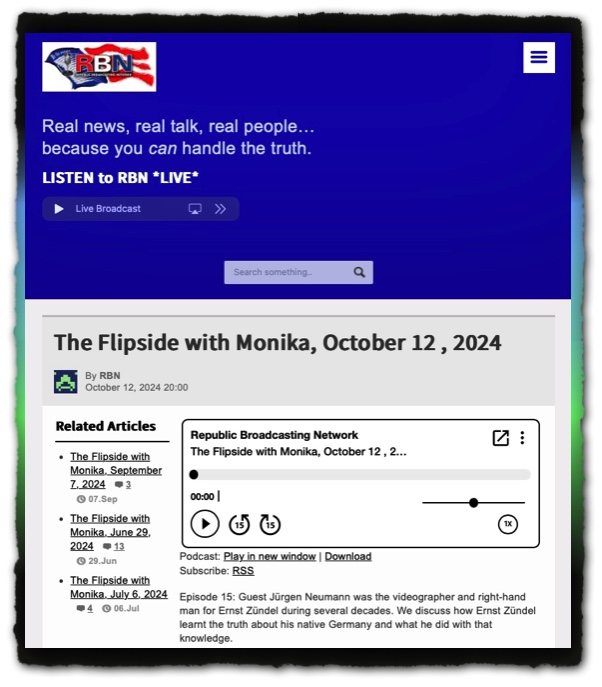

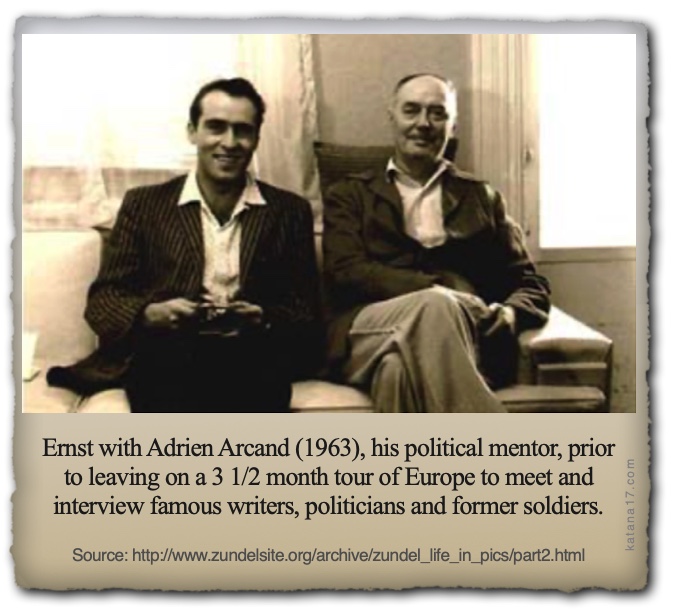
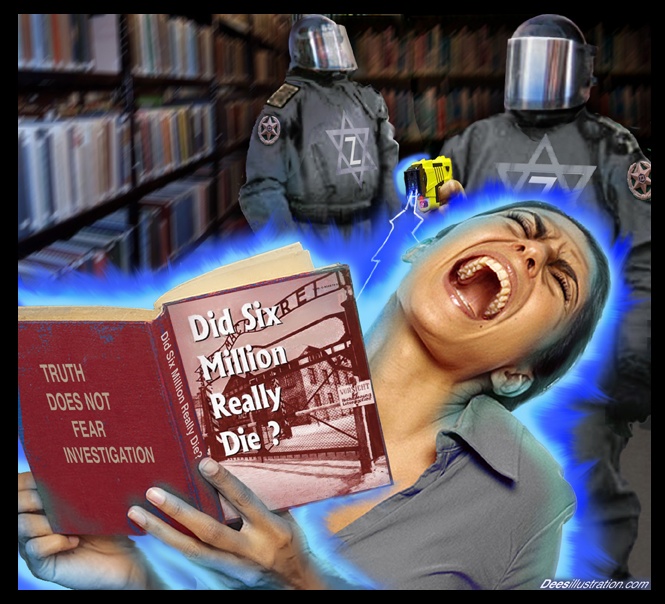
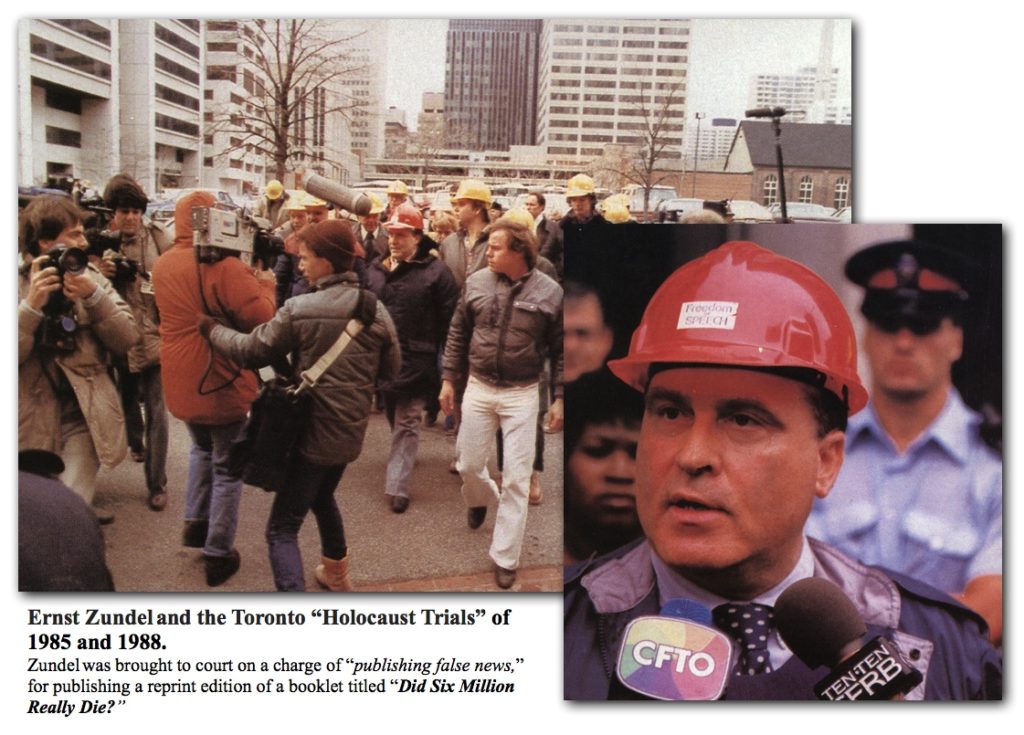



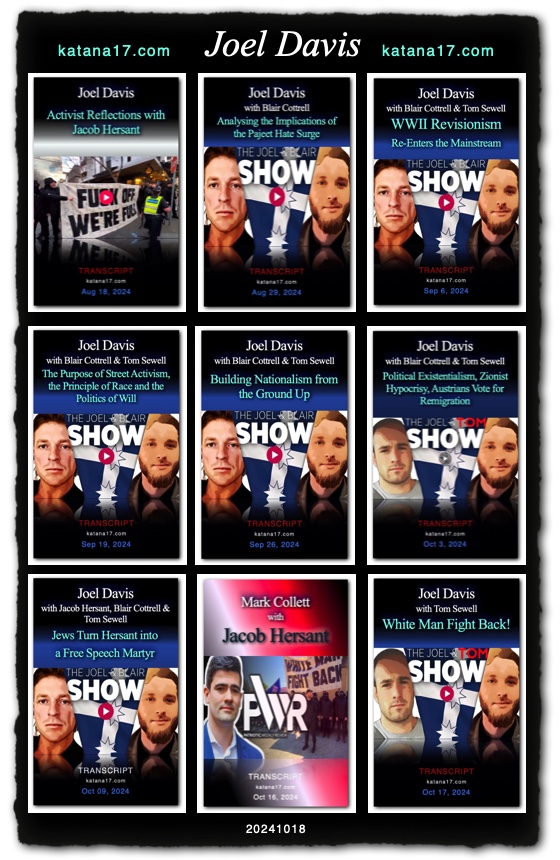

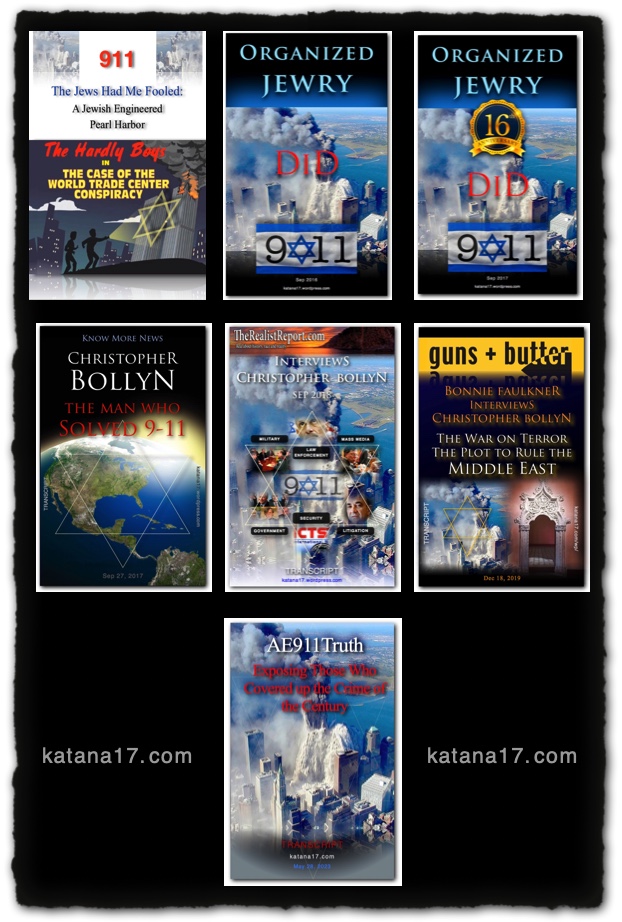
Pingback: The Flipside with Monika – Ep 2 – Jul 6, 2024 – Transcript | katana17
Pingback: The Flipside with Monika – Ep 18 with Jürgen Neumann – Nov 2, 2024 – Transcript | katana17
Pingback: The Flipside with Monika – Ep 20 with Kathleen Dudley – Nov 16, 2024 – Transcript | katana17
Pingback: The Flipside with Monika – Ep 27 – Germar Rudolf – Jan 18, 2025 – Transcript | katana17
Pingback: Joel Davis – The Self-Imploding Legitimacy of Our Opposition, Why Are They So Afraid? – Feb 14, 2025 – Transcript | katana17
Pingback: Monika Schaefer – The Flipside with Monika – Ep 24 – Prof Tony Hall – Dec 21, 2024 – Transcript | katana17
Pingback: The Flipside with Monika – Ep 36 with Jürgen Neumann on Ernst Zundel – Mar 22, 2025 – Transcript | katana17
Pingback: Ernst Zundel – 1967-68 Radio Shows in Montreal Discussing Israel and Jewish Topics 1 – Transcript | katana17
Pingback: Ernst Zundel – 1967-68 Radio Shows in Montreal Discussing Israel and Jewish Topics 2 – Transcript | katana17
Pingback: Ernst Zundel – Media Tactics 2 – Interview with John Reynolds, CJOR Radio – Aug, 1978 – Transcript | katana17
Pingback: Ernst Zundel – My Life and Political Awakening – 1979 – Transcript | katana17